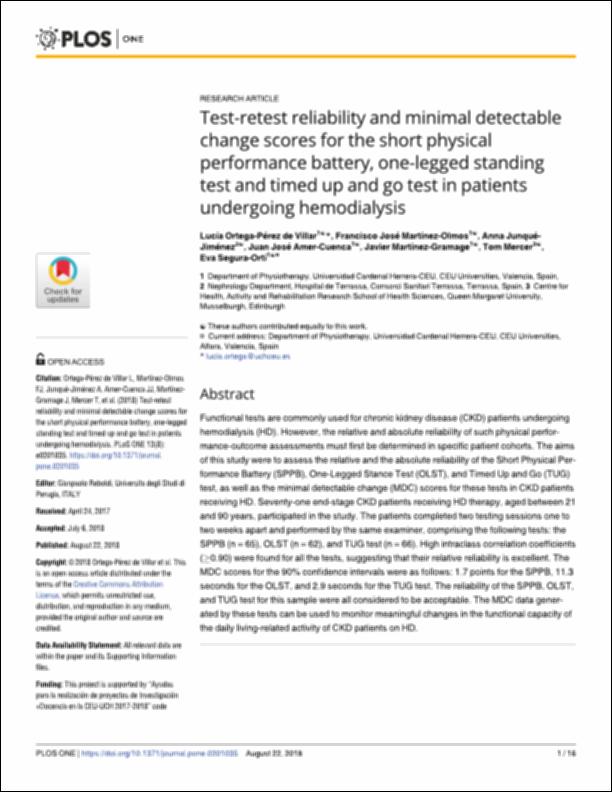Por favor, use este identificador para citar o enlazar este ítem:
http://hdl.handle.net/10637/10529Test-retest reliability and minimal detectable change scores for the short physical performance battery, one-legged standing test and timed up and go test in patients undergoing hemodialysis
| Título : | Test-retest reliability and minimal detectable change scores for the short physical performance battery, one-legged standing test and timed up and go test in patients undergoing hemodialysis |
| Autor : | Ortega Pérez de Villar, Lucía Martínez Olmos, Francisco José Junqué Jiménez, Anna Amer Cuenca, Juan José Martínez Gramage, Javier Mercer, Tom Segura Ortí, Eva |
| Materias: | Kidneys - Diseases - Patients - Treatment.; Riñones - Enfermedades - Pacientes - Tratamiento.; Insuficiencia renal crónica - Pacientes - Tratamiento.; Chronic renal failure - Patients - Treatment.; Insuficiencia renal crónica - Pacientes - Evaluación funcional.; Hemodialysis.; Riñones - Enfermedades - Pacientes - Evaluación funcional.; Chronic renal failure - Patients - Functional assessment.; Kidneys - Diseases - Patients - Functional assessment.; Hemodiálisis. |
| Editorial : | PLOS. |
| Citación : | Ortega Pérez del Villar, L., Martínez Olmos, FJ., Junqué Jiménez, A., Amer Cuenca, JJ., Martínez Gramage, J., Mercer, T. et al. (2018). Test-retest reliability and minimal detectable change scores for the short physical performance battery, one-legged standing test and timed up and go test in patients undergoing hemodialysis. PLoS ONE, vol. 13 (august), n. 8, art. e0201035. DOI: https://doi.org/10.1371/journal.pone.0201035 |
| Resumen : | Functional tests are commonly used for chronic kidney disease (CKD) patients undergoing hemodialysis (HD). However, the relative and absolute reliability of such physical performance-outcome assessments must first be determined in specific patient cohorts. The aims of this study were to assess the relative and the absolute reliability of the Short Physical Performance Battery (SPPB), One-Legged Stance Test (OLST), and Timed Up and Go (TUG) test, as well as the minimal detectable change (MDC) scores for these tests in CKD patients receiving HD. Seventy-one end-stage CKD patients receiving HD therapy, aged between 21 and 90 years, participated in the study. The patients completed two testing sessions one to two weeks apart and performed by the same examiner, comprising the following tests: the SPPB (n = 65), OLST (n = 62), and TUG test (n = 66). High intraclass correlation coefficients ( 0.90) were found for all the tests, suggesting that their relative reliability is excellent. The MDC scores for the 90% confidence intervals were as follows: 1.7 points for the SPPB, 11.3 seconds for the OLST, and 2.9 seconds for the TUG test. The reliability of the SPPB, OLST, and TUG test for this sample were all considered to be acceptable. The MDC data generated by these tests can be used to monitor meaningful changes in the functional capacity of the daily living-related activity of CKD patients on HD. |
| Descripción : | Este artículo se encuentra disponible en la página web de la revista en la siguiente URL: https://journals.plos.org/plosone/article?id=10.1371/journal.pone.0201035 |
| URI : | http://hdl.handle.net/10637/10529 |
| Derechos: | http://creativecommons.org/licenses/by/4.0/deed.es |
| ISSN : | 1932-6203. |
| Fecha de publicación : | 22-ago-2018 |
| Centro : | Universidad Cardenal Herrera-CEU |
| Aparece en las colecciones: | Dpto. Enfermería y Fisioterapia |
Los ítems de DSpace están protegidos por copyright, con todos los derechos reservados, a menos que se indique lo contrario.


